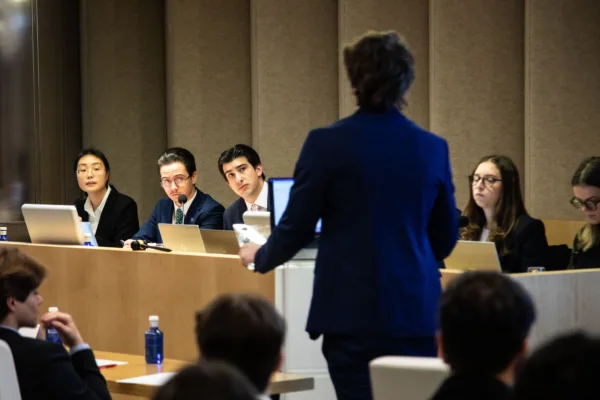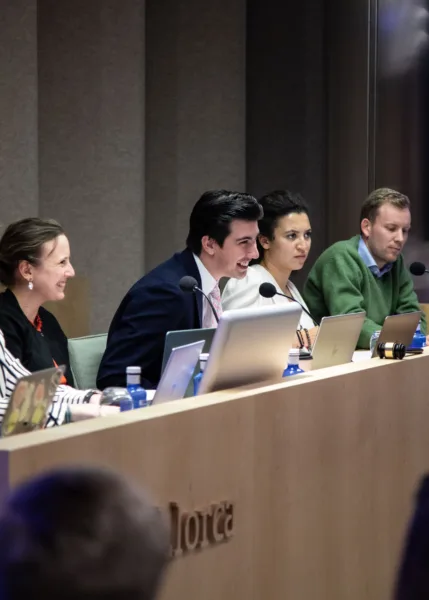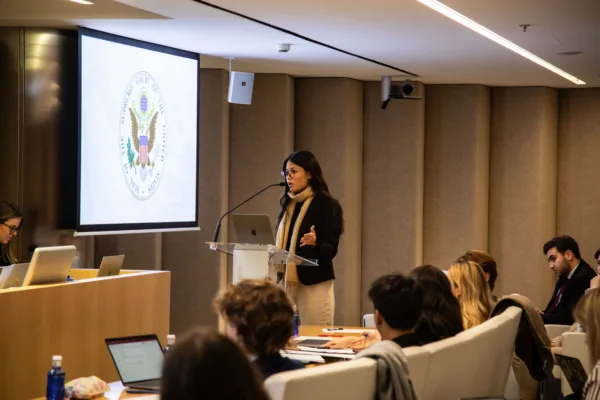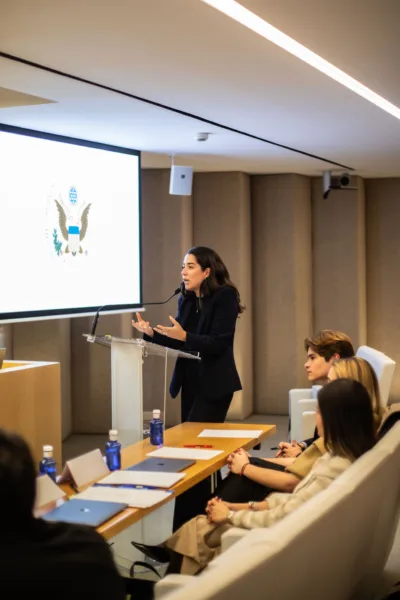On November 13th, a group of students from the IE Law School gathered in the hallowed halls of Pérez Llorca – a renowned law firm based in Madrid – for the final of the second edition of the Mitchell McLean Mock Trial competition. Hosted by the IE chapter of the European Law Students Association (ELSA), the competition provided students with the opportunity to transcend the confines of the university syllabus and put themselves in the shoes of real litigators, gaining first-hand insight into legal practice in the U.S. common law system.

The four teams that made it to the final round were split into two sessions. Each one simulated a trial of a hate-crime presided over by the U.S. Supreme Court. The atmosphere inside the courtroom was electric and competitive, charged with the same intensity that is so characteristic of high-stakes trials. Similar to a fast-paced verbal match of ping-pong, each argument was delivered and countered with such precision and fervour that every statement could tip the scales of justice. The well-prepared teams made it difficult for the distinguished panel of judges – a diverse mix of current IE graduate law school students, seasoned criminal lawyers, and attorneys from Pérez Llorca – to rule in favour of either side.

Although third-year LLB student Dane Chilton, founder of the Mitchell L. McLean Mock Trial Competition, and second-year LLB-BBA student Luca Diaz Hilterscheid designed the cases for the trial rounds, the final case was written by the American Bar Association, which ELSA IE used under licence. The case challenged participants with a topic that resonated with contemporary issues of justice and civil rights. The case revolved around the disputed actions of 23-year-old Officer Campbell, who trailed Jennings, a young African-American man, before pulling him over to request his identification and ask him to step out of his vehicle. The officer’s actions were contested by the prosecution as a violation of Jennings’ Fourth Amendment rights, which protect citizens from unreasonable search and seizures.
The situation escalated when Jennings refused to exit his vehicle; in response, Campbell discharged his firearm, leaving Jennings critically injured. The crux of the case came after a shocking remark was attributed to Campbell, in which he reportedly bragged to fellow officers, “at least one more African American won’t be able to breed.” This statement brought the case into the realm of a hate crime and highlighted issues of racial prejudice and power abuse within U.S. law enforcement. The judges initiated the session by probing the counsel to determine whether Campbell’s actions were racially motivated or reasonably justifiable by protocol. The first-place team, which acted as the defence counsel for Officer Campbell, constructed an intricate argument against the expansion of hate-crime statutes to capture police actions. The opposing prosecution argued that the accusation effectively constituted a hate crime.

The individual members of each side were bestowed with honours that recognized their composure in Court and their well-planned argumentation strategies (see Addendum). Additionally, the first-place team was awarded with “Best Written Brief” for their contributions in the first and second rounds of the Mock trial. The team also won both claims brought against them, one concerning the admissibility of illegally obtained evidence and the other regarding the applicability of qualified immunity.

When asked about their winning strategy, the first-place team credited their adaptability and willingness to learn: “We embraced a flexible approach. We learned, adjusted, and applied our newfound knowledge in subsequent rounds,” Ana di Filippo explained. This versatility, coupled with their methodology of dividing tasks and then converging for a comprehensive review of the cases and brief preparation, played a crucial role in their success. One member added that preparing for such a multifaceted case was “both challenging and enlightening,” describing the entire journey as a “learning curve” that provided the team with invaluable insights into the U.S. legal system. For di Filippo, the winning recipe was a combination of rigorous preparation and the confidence it fostered, as it made the team’s explanations more fluid and convincing: “Being well-prepared not only bolstered my confidence but also ensured a more effective contribution to our team’s success.”

Adriana Martínez, who earned the distinction of ‘Best Attorney’, shared a personal insight that she considers to be the secret to succeeding in competitions of this nature: “Confidence takes you a long way. It is key to believe in what you are saying, because that is what convinces others of your ideas. Eloquence comes from confidence.” Her comment highlights the importance of losing expectational fears. Martínez also shared that the biggest hurdle her team faced was reconciling academic work with extracurriculars, especially in the peak of exam season; in order to prepare well for the competition, teams found themselves clearing entire blocks of their schedules to work morning to afternoon. The long hours spent working alongside each other also helped the teams develop a strong bond and group chemistry.
As a complementary activity to the already practical nature of IE’s law degree, the mock trial is a glimpse into the life of a lawyer. Now in its second year, the competition has received over 100 participants from all over the world, an indication of future growth and a nod to McLean’s legacy of respect and passion for the practice of law. As noted by Chilton, “Now that we have institutional contacts, we are able to provide bigger cases, more planned-out sessions, and more coaching.”
The intense and competitive dynamic of the trial was intimidating, but in reality, despite representing opposing stances, both sides shared a common objective: the pursuit of justice, a value embodied by Mitchell L. McLean.
Team Addendum
| Prosecution Session 1 | Distinctions | Defence Session 1 | Distinctions |
| Alex Tilkin | Matilde Romagnoli | Professionalism Award | |
| Guztav Nadler | Alya Rezk | ||
| Juliana Giraldo | Iñaki Acha | ||
| Claudia Espinosa | Honorary Dist. | Imanol Auza | |
| Adela Casado | Temir Nyrov | ||
| Sofia Radici | Maksim Kudinov |
| Prosecution Session 2 | Distinctions | Defence Session 2 | Distinctions |
| Anna Gramann | Professionalism Award | Tania Puiatti | |
| Federico Opertti | Honorary Distinction | Ana Difilippo | Honorary Distinction |
| Louis Schmitz | Daniela de la Peña | ||
| Rania Sarahni | Adriana Martínez | Best Attorney | |
| Vansh Bijlani | Best Attorney | Santiago Quintero |
Cover Image Caption: Maksim Kudivov addresses the Court as the first speaker of the first session.
All images courtesy of ELSA IE’s media team.







